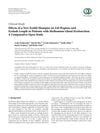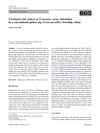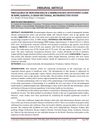 January 2018 in “Journal of general practice”
January 2018 in “Journal of general practice” Young people are losing hair due to stress, poor diet, pollution, and lack of sleep, but it can be treated with supplements and scalp treatments.
 December 2023 in “JEADV Clinical Practice”
December 2023 in “JEADV Clinical Practice” A woman's hair grew back with baricitinib treatment, but she developed a temporary hairy tongue that was treated with regular tongue brushing.
 13 citations,
January 2016 in “Journal of Ophthalmology”
13 citations,
January 2016 in “Journal of Ophthalmology” A new eyelid shampoo improved eyelid hygiene and eyelash length in people with Meibomian Gland Dysfunction.
 3 citations,
January 2019 in “International Journal of Trichology”
3 citations,
January 2019 in “International Journal of Trichology” The article concludes that treating hair loss requires careful research, understanding the causes, and personalized treatment plans.
 6 citations,
February 2015 in “Journal of parasitic diseases”
6 citations,
February 2015 in “Journal of parasitic diseases” Ivermectin injections and spray, along with hygiene measures, successfully treated sarcoptic mange in guinea pigs.
 6 citations,
July 2006 in “International Journal of Dermatology”
6 citations,
July 2006 in “International Journal of Dermatology” Football players can get many skin conditions from their sport, which need different treatments and can be prevented with good hygiene and protection.
 35 citations,
April 2006 in “Ocular Surface”
35 citations,
April 2006 in “Ocular Surface” Cosmetics and procedures can cause eye issues, from mild discomfort to serious conditions, due to allergies, toxins, or poor care.
 7 citations,
October 2019 in “Elsevier eBooks”
7 citations,
October 2019 in “Elsevier eBooks” Maintaining skin health is crucial for overall well-being and involves protecting against environmental damage and using skincare products.
 21 citations,
July 1988 in “Clinics in dermatology”
21 citations,
July 1988 in “Clinics in dermatology” Good haircare and communication with doctors are key for managing hair loss.
 April 2021 in “Arab Journal of Nuclear Sciences and Applications/Arab Journal of Nuclear Sciences and Applications ”
April 2021 in “Arab Journal of Nuclear Sciences and Applications/Arab Journal of Nuclear Sciences and Applications ” Repeated use of protein hair conditioner with heat or gamma irradiation can harm skin and hair health in rats.
22 citations,
January 2020 in “Veterinary dermatology” The conclusion is that certain dog and cat breeds are prone to Malassezia dermatitis, which can be diagnosed with skin tests and treated with antifungal shampoos or medications, and preventing relapses involves managing underlying issues and maintaining good hygiene.
 21 citations,
June 2020 in “Dermatologic Therapy”
21 citations,
June 2020 in “Dermatologic Therapy” The COVID-19 pandemic led to fewer dermatology visits and changed the types of skin conditions patients experienced.
 16 citations,
August 2018 in “Journal of empirical legal studies”
16 citations,
August 2018 in “Journal of empirical legal studies” Repealing tampon taxes helps low-income people the most by making menstrual products cheaper.
 1 citations,
October 2013 in “Actas Dermo-Sifiliográficas”
1 citations,
October 2013 in “Actas Dermo-Sifiliográficas” Customized medications made through compounding can be beneficial for various skin conditions but require careful regulation and collaboration between doctors and pharmacists.
 38 citations,
June 2005 in “Contact Dermatitis”
38 citations,
June 2005 in “Contact Dermatitis” Patient had scalp allergy from minoxidil; test helped identify cause and suggest alternative treatments.
 48 citations,
May 2012 in “Journal of Midwifery & Women's Health”
48 citations,
May 2012 in “Journal of Midwifery & Women's Health” Polycystic Ovary Syndrome is common but often undiagnosed, and early treatment is important to prevent health problems.
 43 citations,
January 2013 in “Indian Journal of Dermatology, Venereology and Leprology”
43 citations,
January 2013 in “Indian Journal of Dermatology, Venereology and Leprology” The article concludes that advancements in hair cosmetics require dermatologists to stay informed about products and their potential risks, including allergies and higher risks for hairdressers.
 18 citations,
January 2017 in “Dermatologic Surgery”
18 citations,
January 2017 in “Dermatologic Surgery” Combining cosmetic procedures with lifestyle changes improves antiaging results.
 3 citations,
January 2019 in “Elsevier eBooks”
3 citations,
January 2019 in “Elsevier eBooks” Pharmacists should interpret lab data and perform physical exams to improve patient care.
 3 citations,
March 1932 in “Journal of the American Medical Association”
3 citations,
March 1932 in “Journal of the American Medical Association” Radium exposure causes severe health issues, so strict safety measures are essential.
 March 2022 in “Journal of South Asian Association of Pediatric Dentistry”
March 2022 in “Journal of South Asian Association of Pediatric Dentistry” Dentists should start preventive treatments early for children with Ichthyosis Vulgaris to avoid dental problems.
 October 2020 in “Journal of Aesthetic Nursing”
October 2020 in “Journal of Aesthetic Nursing” The JCCP wants new rules for the UK aesthetics industry to improve safety and standards.
 July 2015 in “Journal of evolution of medical and dental sciences”
July 2015 in “Journal of evolution of medical and dental sciences” The most common skin diseases found were contact dermatitis, scabies, fungal infections, urticaria, and acne, highlighting the need for better public health policies and awareness.
 1 citations,
January 2015 in “Springer eBooks”
1 citations,
January 2015 in “Springer eBooks” Chemotherapy can cause skin side effects that affect patients' lives, but they can be managed to avoid interrupting cancer treatment.
34 citations,
July 2020 in “Dermatologic Therapy” Searches for acne, hair loss, and eczema increased during COVID-19, while searches for other skin issues decreased.
 16 citations,
November 2020 in “PLOS ONE”
16 citations,
November 2020 in “PLOS ONE” Your lifestyle and health can affect your chances of getting COVID-19; not enough sleep, lots of exercise, and hair loss can increase risk, while washing hands, eating fruit daily, and taking vitamins A and C can lower it.
 3 citations,
May 2018 in “Journal of nutritional health & food science”
3 citations,
May 2018 in “Journal of nutritional health & food science” Nutritional supplements can help manage hair loss and promote hair growth by strengthening hair roots and countering harmful effects of pollution, smoking, and deficiencies in vitamins and minerals.
 24 citations,
March 2015 in “Best Practice & Research in Clinical Obstetrics & Gynaecology”
24 citations,
March 2015 in “Best Practice & Research in Clinical Obstetrics & Gynaecology” Some skin conditions are common during pregnancy and can be safely treated without affecting the pregnancy outcome.
 36 citations,
May 2004 in “The journal of small animal practice/Journal of small animal practice”
36 citations,
May 2004 in “The journal of small animal practice/Journal of small animal practice” Combining cyclosporine A and ketoconazole can effectively treat anal furunculosis in dogs, with some experiencing recurrences and mild side effects.
 March 2012 in “Pathy's Principles and Practice of Geriatric Medicine”
March 2012 in “Pathy's Principles and Practice of Geriatric Medicine” Older adults often have skin problems due to aging, and treating these conditions requires attention to both physical and mental health.




























